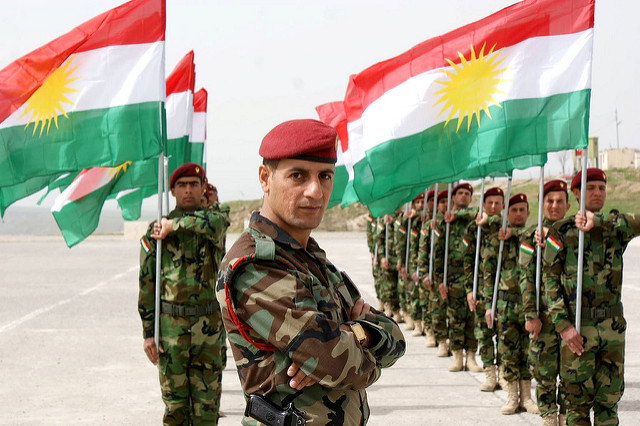 Flickr | Kurdishstruggle
Flickr | Kurdishstruggle
The Kurdish Message to DC: We Need More Money
Qubad Talabani, the Deputy Prime Minister of the Kurdistan Regional Government, had a message to deliver last week at the Foundation for Defense of Democracies 2016 Washington Forum. His message was clear. With the KRG facing a $100 million shortfall each month, the Deputy Prime Minister didn’t mince words: “We are facing a very dark financial and economic situation… we need direct budgetary support… [and] we’ve made this explicitly clear to our friends in the U.S. government.”
As pointed out by the panel moderator, Michael Gordon of the New York Times, the KRG has a massive government and civil service sector. Talabani admitted that when oil was $100 a barrel the KRG dispersed that revenue and expanded their social safety net: “A very wide net was cast, which we could afford at $100 a barrel, but [which is] crippling us at $30 a barrel.”
The Deputy Prime Minister went on to blame a lack of independent sovereignty and mismanagement from Baghdad for the present situation. Talabani pointed out that because the KRG is not a country, they lack many of the levers sovereign states can use to manage their economy, such as devaluing their currency, borrowing in international markets, or issuing domestic bonds. The prospects of a more comprehensive assistance package to Iraq seemed unlikely in Talabani’s view, due in large part to political turmoil.
Many of the roots of the KRG’s financial problems were laid at Baghdad’s door. “We’re a sub-sovereign entity, but we’re facing challenges that even large powers would have difficulties dealing with,” remarked Talabani, citing pressures from the 1.8 million displaced people and refugees currently in the KRG, the ongoing war with ISIS, and financial pressures brought by mismanagement and the drop in oil prices. “We’re being spoon-fed military support in this war from the ground,” he went on to say, applauding the significant impact of the U.S. air campaign, but finding underlying budgetary and humanitarian support lacking. “Iraq is providing no assistance to us.” While the KRG receives 17% of the Iraqi federal budget, Talabani argues that the Kurdish Regional Government deals with more than 17% of the fighting and more than 17% of the refugees, and deserves a greater share of funds.
According to the Deputy Prime Minister, earlier this year the KRG slashed government spending by around 46% and employee compensation by another 39%, in order to signal their serious intent “on this road to reform.” Talabani went on to state that the KRG welcomed conditions to be placed on any financial aid package as a conduit to enact needed strategic reforms. “A year ago, weapons were our number one request… in this year, our economic situation has declined drastically.” Asked how much financial assistance the KRG expected, Talabani replied, “We will take any amount.”
At the heart of the plea for financial assistance there seemed to be a request for political support to make the unpopular reforms needed to stabilize the KRG’s economy. Chief among these challenges will be diversifying their revenue streams beyond oil, and investing more in infrastructure and capital development. As Talabani presciently noted, these challenges are foreboding enough during times of peace, but in the middle of a war with ISIS and political turmoil within the Iraqi Federal Government these obstacles seem impassable. Behind Talabani’s request for direct budgetary support was a wider cry for outside help to empower the KRG to get their house in order. The U.S. can certainly provide the KRG with the political will, guidance, and support to rehabilitate their economy and make politically unpopular decisions. This is problematic only because the U.S. is committed to bolstering the Iraqi Federal Government, and is unwilling to provide direct support to the KRG that would weaken Baghdad’s internal governance. This hesitance, however, may cost the U.S. the opportunity to support and strengthen one of the region’s rare secular and democratic governments.
The narrative delivered by Talabani and his Minister of the Interior, Sinjari, seemed to imply that any significant role Kurdish forces could play in the future would be limited if their economic situation was not addressed. Behind this political narrative lurked an underlying frustration with the Iraqi government. In Talabani’s closing remarks, the Deputy Prime Minister was not shy about voicing this frustration or about the need for a dialogue over Kurdish independence. Addressing the audience Talabani asked, “What have we benefited from this country called Iraq?”





